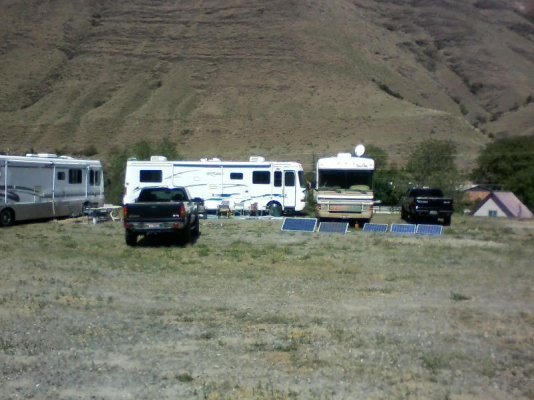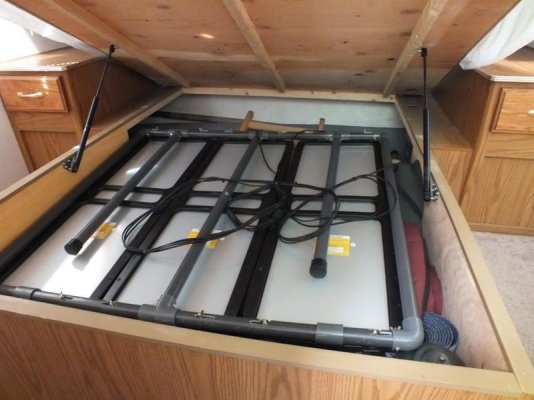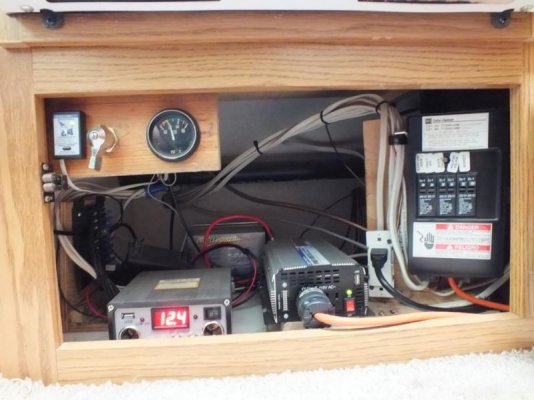thcguy12 said:
It is so interesting how everyone works different. Took my RV over to the local RV place today to have it checked out before it heads off for duty.
They installed a new deep cell battery. Filled the two standard propane tanks. Started and tested water pump, sinks, heater, tanks. etc. We filled and emptied and sanitized the tanks. They were impressed that not much needed work. A tiny leak in the grey water tube right next to the dump area and we fixed that right up.
Several people there (who work at an rv dealership) said that running the following my battery should last all summer and I would be lucky to go through one tank of propane. They said if I want to invest in a trickle solar charger fine but def. not needed.
Lights at night only (four days a month - only after dark)
Heater (at night only - four days a month)
Fridge (four days a month total)
Water pump (four days a month - only when running water - turn off after)
They did say NOT TO run the stereo or charge things like cell phones or speakers - that will kill battery fast.
I guess we will see - we take it up next weekend.
thc...mountains? Are you here in Colorado?
Every trailer/ user are different in their needs. Our single battery made it three days with below freezing temps at night but we were extremely conservative too. After three days I use jumper cables and the truck for a hour or so a night to make sure the furnace kept running. Worked in a pinch but not something I'd want to do normally.
We did get a generator for the next year and you are right. i don't care if it is a open frame or the quietest inverter generator, it is senseless to go through the effort to find the spots, drive all that way and then listen to a generator. Add in that the generator wont completely recharge your battery in a few hours, the last 10% takes forever and that's a lot of gas for very little.
We switched to LED lighting that cost $1.79 each "bulb". That meant we could light up the trailer end to end for less power than running a few incandescent bulbs. We used a portable solar set up that we set out while camping, it not only recharged the battery after the nightly run of furnace but covered many small loads during the day when the battery didn't need as much charge. ( it tapers as it gets fuller.) The thing is i also brought the battery home to be put on a plug in charger not because the solar couldn't fully charge it but because it is critical for ANY battery to be fully recharged and kept that way when not in use. Otherwise you lose capacity. Once I mount my system this wont be an issue as it will always have the time to bring the batteries back up.
That portable was a single 230w panel, 10 awg wire and a controller. Close to the same as the 200w kits you find on ebay for around $300 including shipping. I used a pair of pine slats and C-clamps as legs and you could with those kits too. Again the issue I see would be getting the battery charged up enough before you came home unless you mounted the system. Portables can follow the sun and produce more because of it, but they produce nothing when stored away.
A trickle charger is intended to keep a fully charged battery that has no loads from self discharging. They are generally so little power that they can't recharge your battery at all.
Rv fridges take quite a while to cool down. Go up Saturday morning and fire it up, it will be later that day before it cools down. You may be better of with a cooler for a one day trip. When we decide to go spur of the moment I will start the fridge and put a gallon and few half gallon frozen jugs in it. That keeps the food cold while the fridge catches up.
If you are in Colorado and near the Denver metro area I may be able to help you out. I'll send a PM.



